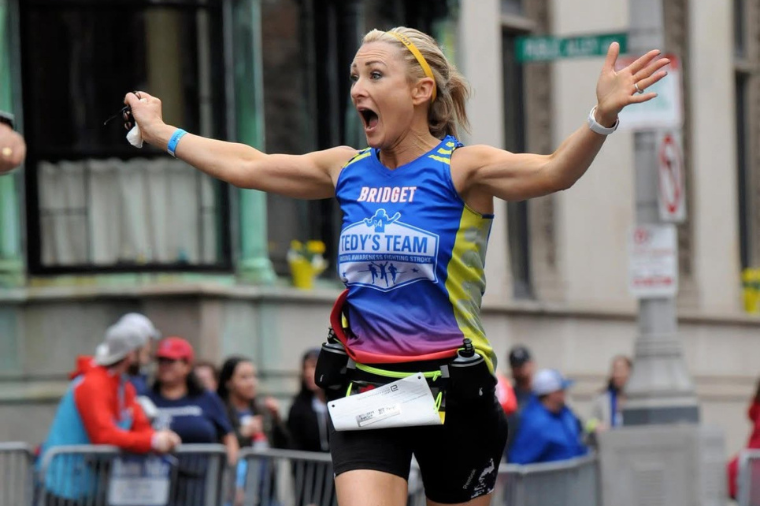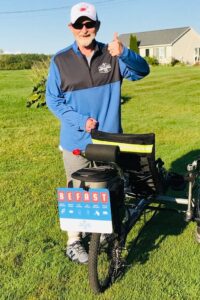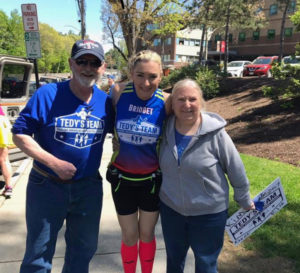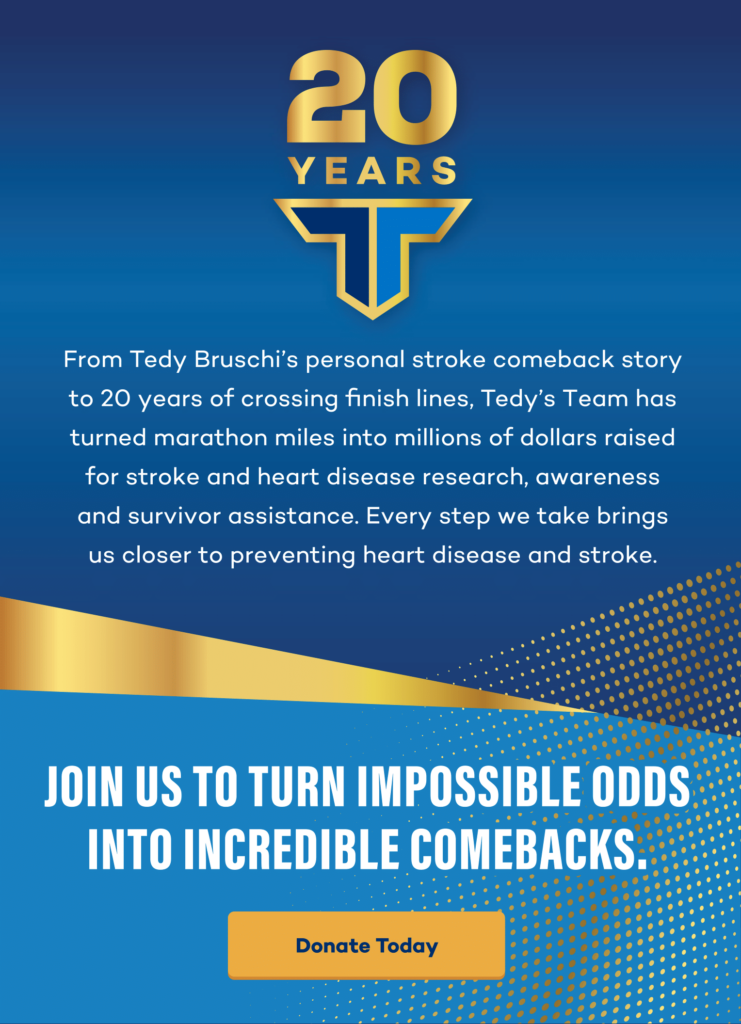Powered by dad’s heart: Why I lace up year after year for stroke recovery
In the Community

Bridget Bouchard joined Tedy’s Team to run the 2019 Boston Marathon in honor of her dad, and stroke hero, Dan King. Since then, Bridget has become an amazing alum, running multiple Boston Marathons, Falmouth Road Races, and volunteering at events throughout the year.
In May 2019, Bridget and Dan shared their story and some helpful advice for stroke survivors and their families. Now, as she gets ready to take on the streets of Chicago with us in October, Bridget is sharing an update on her story and what keeps her coming back to Tedy’s Team year after year.
I run marathons for one reason: to give stroke and heart attack survivors, and their families, the same lifeline that Tedy’s Team gave mine. My dad, Dan King, suffered a hemorrhagic stroke in March 2009, and his journey back has taught me more about resilience than any training plan ever could.
 Dad also showed me what it means to give back long before he needed help himself. On Christmas Eve 2008, just months before his stroke and, though we didn’t know it, his last holiday as a fully able-bodied man, he asked me to pull off the highway in Concord, New Hampshire. A tent village had sprung up by the river after the mortgage crisis displaced dozens of families. Dad trudged through the snow from tent to tent, quietly handing each family enough cash for Christmas dinner. When he climbed back into the truck, mom and I started at him in stunned silence. He simply shrugged and said, “no one should ever be hungry on Christmas.”
Dad also showed me what it means to give back long before he needed help himself. On Christmas Eve 2008, just months before his stroke and, though we didn’t know it, his last holiday as a fully able-bodied man, he asked me to pull off the highway in Concord, New Hampshire. A tent village had sprung up by the river after the mortgage crisis displaced dozens of families. Dad trudged through the snow from tent to tent, quietly handing each family enough cash for Christmas dinner. When he climbed back into the truck, mom and I started at him in stunned silence. He simply shrugged and said, “no one should ever be hungry on Christmas.”
That is the person my dad is, and that spirit of everyday generosity is what powers every mile I run for Tedy’s Team.
When I joined Tedy’s Team in 2019, I thought I was raising money and awareness to help other stroke survivors, their caregivers, and for much needed research. I didn’t realize how valuable the Tedy’s Team community would be for my family. I didn’t realize how quickly that team would become some of my best friends, and my family.
A year later, at the start of COVID, my mom had a stroke of her own and my dad and I couldn’t even accompany her into the hospital. My teammates texted, offered to find specialists near our hometown, and reminded us – hourly, if necessary – that progress isn’t measured in giant leaps but in tiny, repeatable victories. Mom made a full recovery and every time she cheers for me on race day, I remember how different that outcome might have been without their help.
In the fall of 2023, it was dad’s turn again: two heart attacks, a triple bypass, and another long road back. The same teammates I logged endless training miles with suddenly offering to drop off food, keep me company at the hospital, and checking in on my dad’s status multiple times a day. We never once felt alone, and that sense of team, the organization and the individual members, have become family.
 Over the years, I have picked up a few lessons that apply just as much to training as they do to recovery.
Over the years, I have picked up a few lessons that apply just as much to training as they do to recovery.
- Stay curious about the small improvements. The day dad could stand and take steps on his own again felt like the ultimate victory.
- Remember that progress is crooked; some afternoons he works outside or rides his trike bike 15 miles, other days he needs a nap after breakfast, and both outcomes are normal.
- Let people help, and always help others, especially when someone is in the early stages of survival.
- Keep a goal on the horizon, big or small, any goal achieved is a win!
If you are early in your own comeback, please know that you do not have to white-knuckle any of this. Lean on your friends, your family, and most of all, this team, and whoever shows up when the medical jargon gets heavy and the progress charts stall out. Celebrate the wins, no matter how small.
That’s why I’ll keep pinning on a bib year after year: every finish line is another chance to fund research, spread the word about the BEFAST warning signs, and remind families that they are not facing this alone. If crisis ever knocks at your door, I hope you have a tribe like ours already lacing up, ready to carry you through.
On October 12th, Bridget will be hitting the pavement with our team of 17 runners as they take on the Chicago Marathon! To support her fundraising and awareness efforts, please visit her personal fundraising page and learn the warning signs of stroke which are best remembered by using the acronym BE FAST, which stands for:
- Balance Difficulties
- Eyesight Changes
- Face Drooping
- Arm Weakness
- Speech Difficulties – and if you notice any of those warning signs, it’s…
- TIME TO CALL 9-1-1.
BE FAST is an acronym to help you quickly recognize common signs of a stroke and to take any necessary action by calling for emergency medical services. Other symptoms may include sudden and severe unexplained headache or migraine with no obvious cause, and confusion or trouble understanding things they would normally know.
Back to All Blog Posts